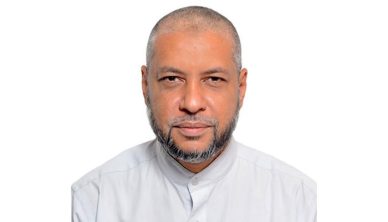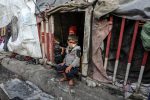“I wish I was a child again.” “Look at that kid’s smile.” “I wish I was able to laugh like that, after all these years.”
For many of us, that desire to experience the world again like a child, with all of the innocence that brings, is commonplace.
Being a child is one of the greatest blessings in life, and childhood is the place where we start to fall in love with this world.
However, this is not the case for all, and particularly for the children of Gaza, where the opposite is the reality.
So how does it feel like to be a child in Gaza today, living under Israeli bombardment?
Imagine being Fatma, a child in Gaza, who does not wake up to the familiar smiles and cuddles of her mother and father at home, but instead wakes up alone in a hospital corridor, confused, afraid and in shock.
She has dust in her eyes and blood on her cheeks, and the pain in her leg from the severe fracture is agonizing.
Human ghosts
Fatma is wondering what she did wrong to have such a nightmare. Why her mum did not wake her up. Why her dad is not there to comfort her, to hug and reassure her like he always does when she is afraid.
Fatma says to herself: “I know I am naughty sometimes, but this is not an excuse to be punished like this.”
The child waits; time passes. Slowly, Fatma starts to learn about her new reality. Her father is missing under the rubble; her mother is cold and lifeless in the corridor; her brothers are either in intensive care, the operating theatre, or the mortuary fridge.
She starts to notice the features of the faces around her. They are humans, but what happened to them to make them appear like ghosts? Why are their faces so empty of blood, of life?
She hears a voice announcing the arrival of her eldest sister, Bisan, the one training to be a family doctor.
Finally, Fatma will see a cherished loved one; her beloved sister can give her some comfort.
“Bisan is arriving,” Fatma hears someone say again. But when Bisan does arrive, she is just pieces of charred flesh.
Fatma stares, thinking that it should be Bisan who is there to treat and repair these wounds, this broken body. What has happened in the world to make things so upside down, she thinks?
Fatma starts to cry, to scream, to fill this world with noise as a final attempt to wake up from this nightmare, one way beyond her worst imagination.
But the nightmare goes on. Still, she can’t wake herself up.
A medic is starting to clean Fatma’s face, wiping away the dust and the blood. Another doctor is checking her fractures, a nurse is soothing her while this madness goes on.
Buried under the rubble
Just a few hundred meters away, Fatma’s cousin, Ahmad, the same age as her, lies in pitch blackness, as he shouts out for help and gets no reply. He is stuck, agitated, panicking; does not yet realise that he is buried under the rubble of their six-storey building.
Ahmad tries to compose himself, and takes a little comfort in the thought that his father, his real-life superhero, who has always protected him and kept him safe, will eventually find and rescue him.
While he waits, he starts to sense the features of the human body beneath him. He slowly starts to remember what happened when the bombardment occurred. His father had grabbed him and they had tried to flee the apartment, but there was no time; the walls and ceiling were collapsing, imploding around them.
His dad, his superhero, had formed a human shield, protecting Ahmad from the explosions, from the metal and concrete, keeping his son safe but dying in the process. He had accomplished his mission; he had kept his child alive.
The task of retrieving Ahmad from beneath the rubble will now have to fall to the rescue teams.
Nearby, Hanan, an 11-month-old baby, was perhaps the first infant in the world to experience free flight, from a four-story building.
She had been with her mum on the roof of their supposedly safe home, when the echo of the same bombardment’s explosions carried her through the air, like a kite, to a nearby farm, where she landed safely, cradled between the branches of a tree; a tree that took her mother’s role.
Who said the time of miracles had gone? But that was the only miracle visited upon the family. The rest perished, murdered by the air strike, their bodies broken and buried in the rubble, leaving their little angel as the only survivor of a miracle and massacre at the same time.
Lived realities
These are not made-up stories, children’s nightmares or fairytales, but real, actual events from just one night in one neighborhood in Gaza.
Many, many more such tragedies are happening every day at places of shelter, at supposed safe places, and these stories will have to be told as well.
These are the lived realities of children’s lives in Gaza. As a reader, you, and only you, have the choice of reading them as stories or as real catastrophes.
I remember my words at the beginning of this piece about the blessings of being a child in this world. It is not a blessing to be a child in Gaza today. It is a curse.
-Bahzad Al Akhras is a Palestinian medical doctor and health policy researcher focused on childhood trauma and community mental health. He was awarded the Chevening Scholarship for emerging leaders in 2019-2020 to pursue a master’s degree in the UK. In 2020, he received his MSc in Child and Adolescent Mental Health with distinction from King’s College London. He aims to pursue a future career in child psychiatry. His article appeared in the Middle East Eye.












